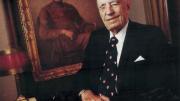One hundred years ago this week, the United States entered the Great War that soon came to be known as World War I. Here, from the Harvard Magazine archives, are first-hand stories of that conflict, collected by Adam Goodheart ’92. Goodheart, now a best-selling author, historian, and journalist, realized shortly after graduating from the College that the Harvard men and women who served in that war were dwindling in number. He began interviewing them in 1993, to hear and capture firsthand their accounts of the war—the smell of cordite, the ferrying of planes to the front, meeting Hemingway—in order to share them with our readers. With photographic portraits by Jim Harrison, and sketches by Susan Avishai.
~The Editors
As a bastion of European culture and of the privileged class that led the pro-war movement, Harvard was far closer to the fight in Europe than the rest of America. “At the western university where I was teaching when the war broke out in Europe,” historian Samuel Eliot Morison wrote later, “it seemed to the average student as unreal as the Wars of the Roses; returning to Harvard in early 1915, one was on the outskirts of battles.”
Read the rest of the article here.









